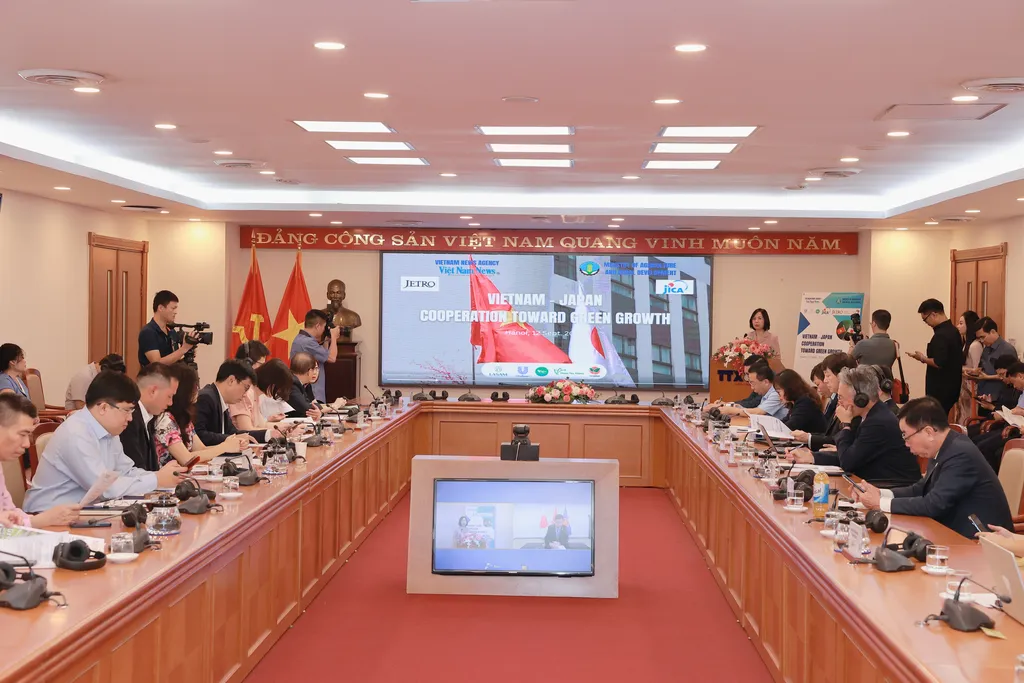 Economy
Economy

 |
| Students at the Việt Nam-Japan Agriculture High School in the northern province of Nam Định. Photo courtesy of the school |
HÀ NỘI - Việt Nam-Japan cooperation in the field of agriculture could improve by 200-300 per cent in the coming decades, said Nguyễn Đỗ Anh Tuấn, head of the International Cooperation Department under the Ministry of Agriculture and Rural Development (MARD) during a seminar themed "Vietnam-Japan cooperation towards green growth" in Hà Nội yesterday.
Key areas for Việt Nam include improving plant varieties, high-tech production and processing, as well as forest protection, capital investment and mitigating the adverse effects of natural disasters, he said.
Meanwhile, some localities in the country have shown great interest in adopting Japan's high school agriculture education model, which aims to equip students with agriculture knowledge along with high school-level general education.
The model, which has been on a pilot programme in the northern province of Nam Định, has proven to be popular, with students coming from all across the country to register.
Vương Thị Minh Hiếu, deputy head of the Department of Industrial Zones under the Ministry of Planning and Investment (MPI) said the programme was in line with Việt Nam's focus on developing and improving the quality of human resources in rural areas, as well as on attracting foreign investment in the field of agriculture.
 |
| Participants attending the seminar in Hà Nội on Tuesday. VNS Photo Trương Vị |
In October 2021, the Prime Minister's Office approved the National Strategy for Green Growth for the 2021-23 period, with a vision to 2025, setting a framework for sustainable development on a nationwide scale with clear objectives including a harmonious relationship between pursuing economic activities and preserving the environment, leveraging advanced technologies and human resources towards a green economy.
In order to realise said objectives, Việt Nam had recognised Japan as a key partner as the advanced East-Asian economy possesses the technologies, experiences and capital investment required.
"There is still a lot of potential for future cooperation between Việt Nam and Japan, especially in the fields of green economy and energy transition," said Phạm Quang Hiệu, the Ambassador of Việt Nam in Japan.
On the other hand, the Japanese Government and businesses have identified Việt Nam as an important economic partner and among the most attractive investment destinations in the Southeast Asia region.
Challenges
Difficulties in securing investment capital, advanced technologies and inadequate skilled labour resources are some of the challenges faced by Việt Nam in the implementation of the national strategy, said Nguyễn Văn Đệ, Deputy Chairman of the People's Committee of Nghệ An Province.
He said Vietnamese farmers also have to adapt to new requirements set by international markets with stiff competition while dealing with the adverse effects of increasingly frequent natural disasters.
Đệ said foreign investors, especially Japanese investors and businesses, could play an important role in addressing the above-mentioned issues.
Meanwhile, foreign firms have long voiced their concerns over a lack of support for green growth projects in the Southeast Asian country.
While praising the Vietnamese government's initiative to improve resource management efficiency and to develop a circular economy, Kinoshita Tadahiro, Director-general of Sojitz Việt Nam, President of the Japanese Chamber of Commerce and Industry in Việt Nam said power supply remained a key concern among foreign companies.
He said some Japanese firms have reported power shortages in recent months in the northern regions of Việt Nam. A solution, which has been put into practice by some, was to install solar panels on the rooftops of their factories, which according to the firms, could help cut down carbon emissions at the same time.
However, many said large-scale investments in solar power remained challenging as they had yet to be allowed a licence or connection to the national grid and, therefore, would be unable to sell their excess power.
Tadahiro asked Electricity Vietnam and the Ministry of Industry and Trade to lay out a legal guideline for foreign firms with renewable energy to join the country's power supply network.
Ellen Van, an investment director from Mekong Capital, advised the government to provide additional support to foreign investors and businesses as they are well-positioned to help create positive impacts on the environment, the economy and Vietnamese society. VNS




